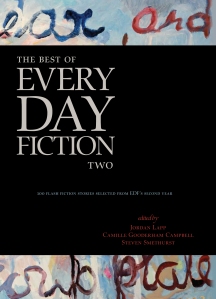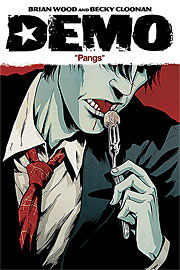My story, “Home to Perfect,” has been included in the Best of Every Day Fiction Two anthology.  The book is now available for order in both hardcover and paperback.
The book is now available for order in both hardcover and paperback.
Every Day Fiction posts one flash piece a day and has developed a great community that comments intelligently on the day’s stories. It’s definitely worth dropping into the feed reader. If reading online’s not your thing, here’s your chance to check out what they do.
I’m very proud of “Home to Perfect,” and I’m glad to see its life extended this way. I thought this might be a nice occasion to talk a bit about what goes on when I write a piece of flash fiction.
I’ve seen a lot of discussion online recently about how long it takes to write various types of fiction. Most of what I read about flash fiction suggests that these are quick, easy pieces that you can dash off in a morning. That’s not my experience at all. The only reason I can afford to write flash is that I have a day job.
“Home to Perfect” took me a solid 15 hours to write. I’ll try to break down how those hours were spent. You should read the story (linked at the top of the post) before reading my explanation–I’m not going to worry about spoilers.
I got the idea when I was poking around the Internet one day and found a video on YouTube of a kid pulling off 100 percent FC on expert of “Through the Fire and Flames” on Guitar Hero. At the end of the video, the kid is visibly trembling, cursing in disbelief, totally overwhelmed (I’d link it now, but I can’t find it anymore–if you search for this on YouTube, you get totally overwhelmed by bots and parody videos). I found myself thinking over the next several days about the kid’s awe and how he shared it with an audience on YouTube. I wondered if his parents had any idea what that moment meant to him.
I spent about 3 hours over the next several days developing the idea. I asked myself who Vic (my main character) was, why he cared about 100 percent FC, and what else was going on in his life. I wrote extensive notes on him, his mom, his dad, and his brother Kurt. This was the point at which I realized that I was writing about domestic violence. I could tell you a lot of details about all of these characters that never made it into the story. I believe a story should be an iceberg–what’s visible should be only a small amount of the material that’s in the author’s possession.
At that point, I wrote my first draft, spending about 2 hours on it. (My first draft rate for longer pieces is much faster, but my speed of writing seems to be inversely related to the length of the piece).
I put my first draft down for about a week. When I picked it up again, something was wrong with it, and I couldn’t figure out what. After much rereading and consideration (which I’m not counting towards the total time spent on the work), I figured out that “Through the Fire and Flames” was the problem. I had no emotional connection to the song, and I hadn’t spent much time playing Guitar Hero. I had, on the other hand, pulled many all-nighters playing Rock Band. There’s a song on Rock Band called “Green Grass and High Tides” that I love deeply and find wickedly difficult (I can beat it on hard, but that’s the best I can do). I changed the story so that Vic is playing Rock Band, and spent about 5 hours writing a new draft. While I wrote this draft, I played “Green Grass and High Tides” on repeat and periodically took breaks to watch videos of people playing this song on Rock Band.
[As an aside, when the story was first posted on Every Day Fiction, fellow writer Deven Atkinson pointed out that the lyrics of “Green Grass and High Tides” are actually very inspiring and appropriate to Vic’s situation. Though I normally pay a lot of attention to song lyrics, I hadn’t in this case. However, the story just didn’t work for me until I saturated it and myself with the mood of this song. I think it’s quite possible that I was subconsciously aware of what the song is saying to Vic.]
At that point, I thought I’d finished the story, so I let my husband read it. As always happens, he made me realize that I was far from finished with the story, pointing out several problems with how it was structured. I spent about 3 hours restructuring and fixing those problems. Then, I spent 2 hours doing a final polish and preparing the story for submission. For me, this consists of reading the whole thing out loud several times, fixing anything that trips me up and fiddling with things until I’m sure I really want to send this out into the world. I run spellcheck. I obsessively study the guidelines for the market to which I’m sending the story.
And that’s a wrap. I’ve wished that I could write faster, but I’m much happier with the version that’s on the Every Day Fiction site than what I would have come up with if I’d stopped after the first or second draft.


